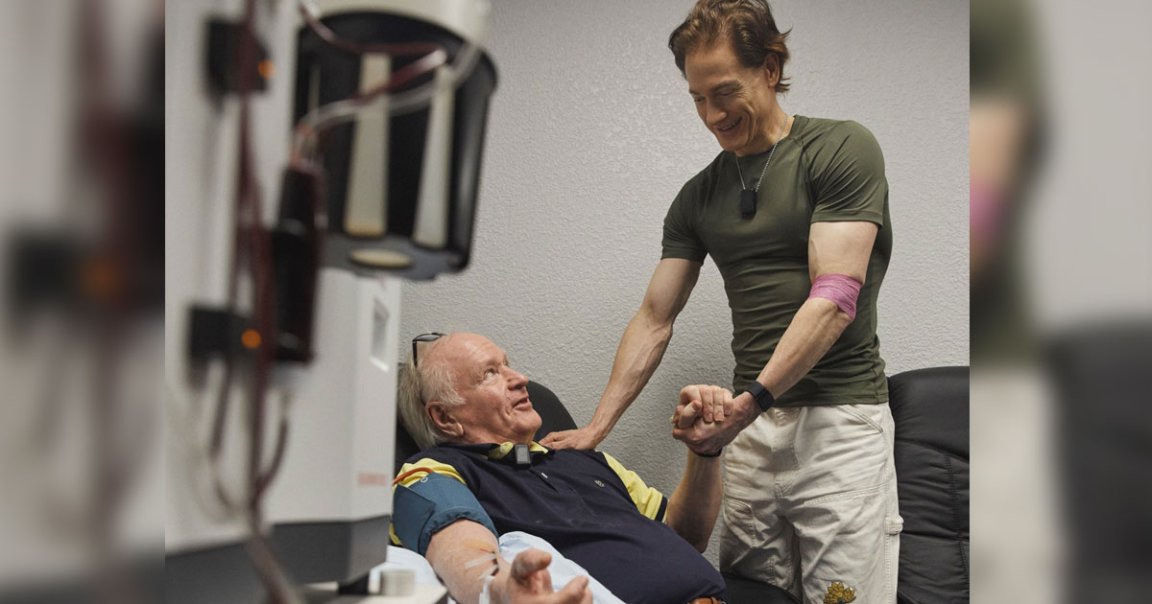
Tech millionaire Bryan Johnson has thrown a ludicrous amount of money at his attempt to turn his biological age back to 18.
He’s tried everything from young blood transfusions from his 17-year-old son to fringe treatments and intense data collection. He’s even tried zapping his genitals, for some reason.
But despite finding that there were “no benefits” to receiving blood transfusions from his teen son earlier this year, Johnson — who was an investor in Futurism back in the day, but has no financial involvement anymore — isn’t ready to call it quits on the controversial procedure just yet.
In a recent tweet, Johnson bragged about donating a liter of his plasma to his 70-year-old father to turn back his biological clock.
“The older we get, the faster we age,” he wrote. “After receiving 1 L of my plasma, my father is now aging at the rate of a 46-year-old.” Six months prior, “he was aging at the rate of a 71-year-old.”
“I am my dad’s blood boy,” he proudly added.
Of course, we should take all of this with a massive grain of salt. We’ve only begun to test the concept in mice and are still far from determining whether swapping plasma can actually reverse aging in humans.
To his credit, Johnson admitted that there were plenty of caveats to his scientifically dubious conclusion.
For one, he conceded that “only one biomarker is being evaluated here,” referring to an aging analysis test by medical startup TruDiagnostic, which is aimed at “anti-aging enthusiasts who want to track the progress of recent lifestyle, environmental, and medical interventions,” per the company’s website.
Experts are skeptical of tests like TruDiagnostic’s TruAge PACE, arguing they may be a complete waste of time. And that isn’t surprising, considering the burgeoning anti-aging industry has long been known to push unsubstantiated consumer-facing products.
“I don’t think it can do what it says it can do,” Daniel Belsky, an assistant professor of epidemiology at Columbia’s Aging Center in New York, told Next Avenue last year, referring to consumer-facing biological testing.
“I wouldn’t pay for this,” Belsky added, “and if it was given to me for free, I wouldn’t take it too seriously.”
Then there’s the uncertainty over whether removing Johnson’s father’s plasma or adding his own plasma was the cause of the promising data.
That’s not to mention the glaring lack of scientific consensus that there’s any benefit to transmitting plasma at all. While it can be used to treat other conditions like burns or blood disorders, and possibly even COVID-19, the concept of using it to turn back the biological clock simply hasn’t been proven yet.
“We have not learned enough to suggest this is a viable human treatment for anything,” Charles Brenner, a biochemist at City of Hope National Medical Center in Los Angeles, told Bloomberg back in April.
It’s a confounding experiment, especially considering Johnson himself found that swapping blood with his much younger son made no difference just four months ago.
“Evaluated biomarkers from biofluids, devices and imaging, no benefits detected,” he tweeted at the time. “Young plasma exchange may be beneficial for biologically older populations or certain conditions.”
Even without any compelling evidence supporting the idea, Johnson hasn’t given up on being — or benefiting from — a “blood boy,” a trend among the ultra-wealthy tech elite that was famously skewered in the HBO comedy “Silicon Valley.”
At the very least, a little self-awareness can go a long way.
More on Johnson: That Millionaire With the Bizarre Health Regimen Is Doing Something Strange to His Genitals